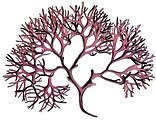– Definition
– Plants are eukaryotes in the kingdom Plantae.
– They are predominantly photosynthetic.
– Exceptions include parasitic plants that lack chlorophyll.
– Historically, plants encompassed all non-animal living things.
– Current definitions exclude fungi and some algae.
– Taxonomic History
– Aristotle and Theophrastus contributed to early plant taxonomy.
– Linnaeus established modern scientific classification.
– Over 380,000 plant species are known.
– Majority of plants produce seeds.
– Various green plant divisions exist, with flowering plants being the most common.
– Evolutionary History
– Land plant ancestors evolved from water-based organisms.
– First land plants appeared around 450 million years ago.
– Diversification of plants occurred in the late Silurian period.
– Basic plant features like roots and leaves were present by the end of the Devonian.
– Flowering plants evolved rapidly in the Cretaceous period.
– Phylogeny
– A 2019 phylogeny based on genomes proposed plant relationships.
– Algal groups’ placement is supported by genome-based phylogenies.
– Chlorophyte and streptophyte algae are considered paraphyletic.
– Classification of Bryophyta is supported by recent studies.
– Land plants emerged from within certain algal groups.
– Importance and Uses
– Plants produce a significant amount of Earth’s oxygen.
– They provide energy for ecosystems and other organisms.
– Plants like grains, fruits, and vegetables are essential human foods.
– Plants are used for building materials, medicines, and more.
– The scientific study of plants is known as botany, a branch of biology.
Plants are the eukaryotes that form the kingdom Plantae; they are predominantly photosynthetic. This means that they obtain their energy from sunlight, using chloroplasts derived from endosymbiosis with cyanobacteria to produce sugars from carbon dioxide and water, using the green pigment chlorophyll. Exceptions are parasitic plants that have lost the genes for chlorophyll and photosynthesis, and obtain their energy from other plants or fungi.
| Plants Temporal range:
| |
|---|---|
| Scientific classification | |
| Domain: | Eukaryota |
| Clade: | Diaphoretickes |
| (unranked): | Archaeplastida |
| Kingdom: | Plantae H.F.Copel., 1956 |
| Superdivisions | |
|
see text | |
| Synonyms | |
| |
Historically, as in Aristotle's biology, the plant kingdom encompassed all living things that were not animals, and included algae and fungi. Definitions have narrowed since then; current definitions exclude the fungi and some of the algae. By the definition used in this article, plants form the clade Viridiplantae (green plants), which consists of the green algae and the embryophytes or land plants (hornworts, liverworts, mosses, lycophytes, ferns, conifers and other gymnosperms, and flowering plants). A definition based on genomes includes the Viridiplantae, along with the red algae and the glaucophytes, in the clade Archaeplastida.
There are about 380,000 known species of plants, of which the majority, some 260,000, produce seeds. They range in size from single cells to the tallest trees. Green plants provide a substantial proportion of the world's molecular oxygen; the sugars they create supply the energy for most of Earth's ecosystems and other organisms, including animals, either consume plants directly or rely on organisms which do so.
Grain, fruit, and vegetables are basic human foods and have been domesticated for millennia. People use plants for many purposes, such as building materials, ornaments, writing materials, and, in great variety, for medicines. The scientific study of plants is known as botany, a branch of biology.








